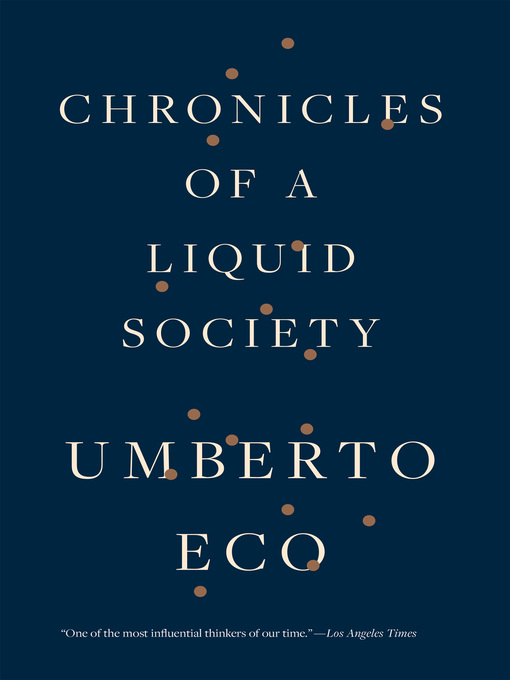
Chronicles of a Liquid Society
کتاب های مرتبط
- اطلاعات
- نقد و بررسی
- دیدگاه کاربران
نقد و بررسی

June 1, 2017
Novelist, essayist, and semiotician nonpareil (see his star turn in Laurent Binet's sensational The Seventh Function of Language), Eco began writing a regular column for the Italian weekly magazine L'Espresso in 1985. It ranged from Herodotus to pop culture but frequently addressed our "liquid society," where community has been lost and friends and colleagues turned into competitors.
Copyright 2017 Library Journal, LLC Used with permission.

August 14, 2017
This posthumous collection of essays reprints spirited selections from a column, “La bustina di Minerva,” that the late novelist Eco (Numero Zero) wrote for the Italian weekly magazine L’Espresso. These “brief jottings,” which span the years 2000–2015, cover a range of topics, including education, technology, racism, and religion, and add up to a picture of a society in flux. Eco’s writing reveals a humanist in every sense of the word, well acquainted with the classics of Western civilization and able to take a broad, often amused view of human affairs. Neither a snob nor a prude, Eco takes as his central theme the value of knowledge, along with the process of identifying, acquiring, preserving, and transmitting it. His conclusions are grounded in moral principles such as tolerance and good old-fashioned courtesy, and the only enemies he identifies are the enemies of knowledge: ignorance, credulity, violence, and fear. Dixon’s translation is seamless, capturing Eco’s erudite style (and keeping the occasional sprinkle of Latin.) This volume’s primary reward lies in the pleasure of watching a finely calibrated, expansive, and logical mind build an argument or deconstruct cant. Eco has left us an intelligent, intriguing, and often hilariously incisive set of observations on contemporary follies and changing mores.

September 1, 2017
A swan song from one of Europe's great intellectuals.After publishing numerous novels, criticism, essays, and so much more, Eco (Numero Zero, 2015, etc.) died in 2016 at the age of 84. Like a few others before him, including Edmund Wilson and Lionel Trilling, among others, Eco proved that one could write for many audiences. Following up on two similar collections, this book contains more than 100 short opinion pieces originally published in L'Espresso magazine from 2000 to 2015. He calls them "reflections on aspects of this 'liquid society' of ours," and they encompass the current crises facing countries across the world, a collapse of ideologies, and the rise of unbridled individualism. They are divided into 13 titled sections, including "From Stupidity to Folly." Eco was no curmudgeon, but he didn't suffer fools gladly--e.g., the "excess of stupidity is clogging the [internet] lines." The author regularly discusses his dislike of cellphones; people "no longer talk face-to-face...no longer reflect on life and death, and instead talk obsessively, invariably with nothing to say." There's a distinct Italian lean to these pieces, so some travel better than others, but it's not so much the information they convey as much as the intellect and thought processes of the conveyor. As Eco admits in one of the last pieces, "don't take the things you have just read as pure gold." In one piece, he discusses the Italian government selling off their Maserati cars; in another, the letters of Ian Fleming, who "was a master of style," and James Joyce. We learn that Eco is a big fan of the "amiable universe" of Rex Stout's Nero Wolfe and that Art Spiegelman is a "genius," Maus "one of the most important pieces of literature on the Holocaust." Even when he's apologizing for not writing prefaces for people's books, Eco entertains with his intellect, humor, and insatiable curiosity. Although some of these pieces have a tired feel, there's much here to enjoy and ponder.
COPYRIGHT(2017) Kirkus Reviews, ALL RIGHTS RESERVED.

























دیدگاه کاربران